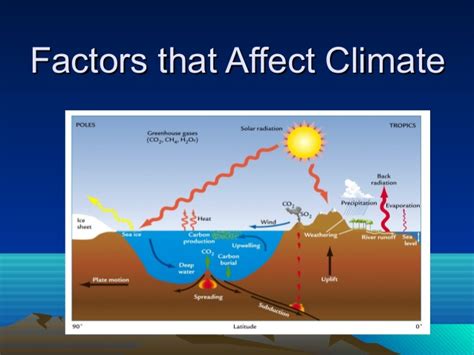Climate has a profound impact on bodies of water around the world. From oceans to rivers, lakes to wetlands, climate plays a crucial role in shaping the health, size, and ecosystems of these vital water sources. In this article, we will explore the 7 ways climate affects bodies of water, and what this means for the future of our planet.
The Impact of Climate on Water Temperature
One of the most significant ways climate affects bodies of water is through changes in water temperature. As the Earth's atmosphere warms due to climate change, the temperature of bodies of water also increases. This can have devastating effects on aquatic ecosystems, as many species are adapted to specific temperature ranges. For example, coral reefs are highly sensitive to changes in water temperature, and even a slight increase can cause coral bleaching and death.

Thermal Expansion and Sea Level Rise
As the temperature of bodies of water increases, it also causes them to expand. This phenomenon, known as thermal expansion, contributes to sea level rise. As the water warms, it expands and takes up more space, leading to an increase in sea levels. This can have severe consequences for coastal communities and ecosystems, including increased flooding and erosion.
The Effects of Climate on Precipitation and Runoff
Climate also affects bodies of water through changes in precipitation and runoff. Changes in precipitation patterns can lead to more frequent and intense droughts and floods, which can have significant impacts on aquatic ecosystems. For example, increased precipitation can lead to more runoff, which can carry pollutants and sediments into bodies of water, causing water quality to decline.

The Impact of Climate on Evaporation and Transpiration
Climate also affects bodies of water through changes in evaporation and transpiration. Evaporation occurs when water is heated and turns into vapor, while transpiration occurs when plants release water vapor into the air. Changes in temperature and precipitation patterns can alter the rates of evaporation and transpiration, leading to changes in water levels and water quality.
The Effects of Climate on Water Quality
Climate can also affect the quality of bodies of water. Changes in precipitation and runoff patterns can lead to increased levels of pollutants and sediments in water, while changes in water temperature can affect the growth and survival of aquatic species. For example, warmer water temperatures can lead to an increase in the growth of algae, which can cause water quality to decline.

The Impact of Climate on Aquatic Ecosystems
Climate can also affect the health and diversity of aquatic ecosystems. Changes in water temperature and chemistry can affect the growth and survival of aquatic species, while changes in precipitation and runoff patterns can alter the distribution and abundance of species. For example, changes in water temperature can affect the distribution of fish species, while changes in precipitation patterns can affect the abundance of aquatic plants.
The Effects of Climate on Human Communities
Finally, climate can also affect human communities that depend on bodies of water. Changes in water levels, water quality, and aquatic ecosystems can affect the livelihoods of people who depend on fishing, tourism, and other industries related to water. For example, changes in water levels can affect the availability of water for irrigation and drinking, while changes in water quality can affect the safety of water for human consumption.

What Can We Do?
So what can we do to mitigate the effects of climate on bodies of water? There are several steps we can take:
- Reduce greenhouse gas emissions to slow the rate of climate change
- Protect and restore aquatic ecosystems to enhance their resilience to climate change
- Implement sustainable water management practices to reduce the impacts of climate on water resources
- Support research and monitoring efforts to better understand the impacts of climate on bodies of water
By taking these steps, we can help to mitigate the effects of climate on bodies of water and ensure the long-term health and sustainability of these vital ecosystems.






What is the impact of climate change on bodies of water?
+Climate change affects bodies of water through changes in water temperature, precipitation, and runoff patterns. This can lead to changes in water quality, aquatic ecosystems, and human communities that depend on these water sources.
What can we do to mitigate the effects of climate on bodies of water?
+We can reduce greenhouse gas emissions, protect and restore aquatic ecosystems, implement sustainable water management practices, and support research and monitoring efforts to better understand the impacts of climate on bodies of water.
Why is it important to conserve water?
+Water conservation is essential for mitigating the effects of climate on bodies of water. By reducing our water usage, we can help to protect aquatic ecosystems, ensure the long-term sustainability of water resources, and support human communities that depend on these water sources.
